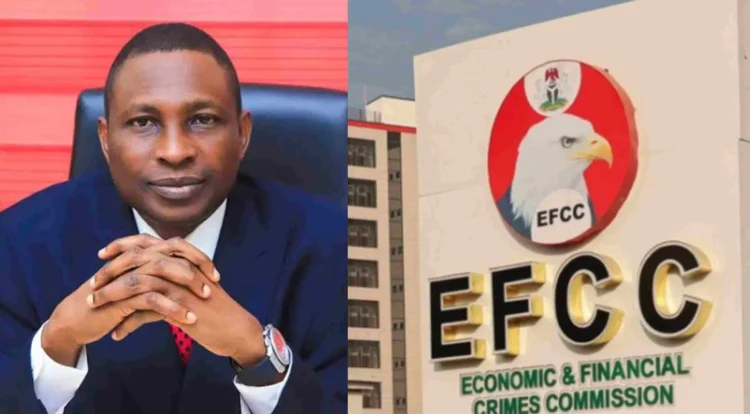The Economic and Financial Crimes Commission (EFCC) has recovered over ₦566 billion, 411 million dollars, and 1,502 properties in the last two years under the leadership of its chairman Ola Olukoyede.
The EFCC boss, represented by Wilson Uwujaren, the Director of Public Affairs, made the disclosure in Abuja on Thursday, at a press conference marking his second anniversary in office.
Olukoyede, who was appointed on Oct. 18, 2023, and confirmed by the Senate the following day, said the commission had made “unprecedented progress” in its fight against economic and financial crimes across all fronts.
According to him, the commission between October 2023 and September 2025, received over 19,000 petitions, conducted 29,240 investigations, filed 10,525 cases in court, and secured 7,503 convictions.
“The commission in the same period recovered ₦566,319,820,343.40, $411,566,192.32, £71,306.25, €182,877.10, and other foreign currencies from proceeds of financial and economic crimes.
“It also recovered 1,502 non-monetary assets, comprising 402 properties in 2023, 975 in 2024, and 125 so far in 2025.
“Among these recovered assets are two notable landmarks: the final forfeiture of 753 units of duplexes in Lokogoma, Abuja, and the forfeiture of Nok University, now the Federal University of Applied Sciences, Kachia, Kaduna State,” he said.
Olukoyede listed several major cases prosecuted within the period, involving former governors Willie Obiano, Abdulfatah Ahmed, Darius Ishaku, Theodore Orji, and Yahaya Bello.
Other high profile cases he said included former ministers Olu Agunloye, Mamman Saleh, Hadi Sirika, and Charles Ugwu, and former Central Bank Governor, Godwin Emefiele.
He said that the EFCC also revived longstanding corruption cases involving prominent figures such as Fred Ajudua, former PDP Chairman Haliru Bello Mohammed, ex-National Security Adviser Sambo Dasuki, and former NSITF boss, Ngozi Olojeme.
Olukoyede noted that in December 2024, the commission arrested 792 suspects in connection with investment and cryptocurrency fraud in Lagos, including 192 foreign nationals who were later prosecuted and deported.
“This development sent a strong message that Nigeria will not allow its territory to be turned into a safe haven for cybercriminals,” Olukoyede stated.
The EFCC chairman disclosed that part of the recovered funds had been channeled into key national programmes, including the Students Loan Scheme and Consumer Credit Scheme, with a total of ₦100 billion invested.
He said other agencies such as the Niger Delta Development Commission (NDDC), Asset Management Corporation of Nigeria (AMCON), Federal Inland Revenue Service (FIRS), and National Health Insurance Authority (NHIA) — also benefited from returned funds.
According to him, some recovered properties were allocated to government agencies for use as offices “in line with the Commission’s policy of ensuring that recovered assets are put to productive use”.
Olukoyede highlighted the creation of a Task Force on Naira Abuse and Dollarisation of the Economy, noting that the initiative has helped sanitize currency operations and reduce speculative pressure on the naira.
He emphasised the Commission’s dual approach to fighting cybercrime through enforcement and prevention, recalling the National Cybercrime Dialogue held in January 2024, and the National Cybercrime Summit in October 2024, where First Lady Sen. Oluremi Tinubu unveiled the Cybercrime Response Centre.
According to him, the EFCC has deepened international partnerships with agencies such as the FBI, UK’s National Crime Agency (NCA), INTERPOL, and Japan’s JICA, resulting in joint investigations and repatriation of stolen assets to victims in Spain, Canada, and the United States.
“In 2024, we had the honour of hosting Christopher Wray, former FBI Director, and the Director General of the NCA, Graeme Biggar, a testament to the global respect the EFCC commands today,” he said.
At the regional level, Olukoyede’s leadership as President of the Network of National Anti-Corruption Institutions in West Africa (NACIWA) led to the establishment of a permanent secretariat in Abuja.
He detailed a series of internal reforms, including the creation of the Directorate of Fraud Risk Assessment and Control (FRAC) to enhance corruption prevention.
Olukoyede reaffirmed his commitment to integrity and professionalism within the Commission, saying, “You cannot fight corruption with corruption.”
He noted that all staff were directed to declare their assets upon his assumption of office.
“Those who breached ethical standards were sanctioned in line with due process; 55 officers have been dismissed over misconduct, including one currently facing prosecution for tampering with exhibits.”
He added that while errant staff have been disciplined, hardworking officers have been rewarded through regular promotions, provision of CNG buses, and payment of allowances.
The EFCC Chairman reiterated that corruption prevention remains a cornerstone of his administration.
“Prevention is a more cost-effective approach than enforcement. That is why we established FRAC to deploy risk-based strategies in monitoring the budget performance of Ministries, Departments, and Agencies,” he said.














